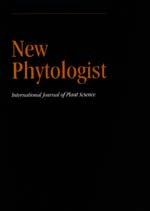Article contents
Effects of liming on the uptake of organic and inorganic nitrogen by mycorrhizal (Paxillus involutus) and non-mycorrhizal Pinus sylvestris plants
Published online by Cambridge University Press: 01 April 1997
Abstract
Seedlings of Pinus sylvestris L. were grown in Plexiglas® observation chambers in limed (CaCO3, pH5·0 and 5·9) and untreated (pH 4·1) peat. The seedlings were either colonized by the mycorrhizal fungus Paxillus involutus (Batsch: Fr.) Fr. Or were non-mycorrhizal. After 18 wk in the observation chambers, 15N-labelled organic nitrogen, as lyophilized and ground mycelium of Suillus variegatus (Swartz: Fr.) O. Kuntze, or ammonium, was added to the peat. The plants were harvested after an uptake period of 14 d.
Irrespective of the nitrogen form added, liming decreased both the content and concentration of 15N in non-mycorrhizal plants, and, to a lesser extent, those in mycorrhizal plants. In mycorrhizal plants the uptake of 15N was not correlated with area colonized by the mycorrhizal mycelium. The amount of KCl-extractable 15N in peat without plants and mycorrhizal fungi decreased with liming. It is proposed that liming induced chemical or microbial immobilization of the added 15N. This is suggested to be the main reason for the decreased uptake of 15N in lime treatments.
- Type
- Research Article
- Information
- Copyright
- © Trustees of the New Phytologist 1997
- 15
- Cited by


